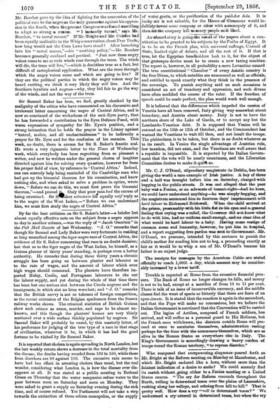By far the best criticism on Sir S. Baker's letter—a
briefer but almost equally effective note on the subject from a negro appears to-day in another column, —was the reply of "Jacob Omninm" in the Pall Mall Gazette of last Wednesday. "J. 0." remarks that though Sir Samuel and Lady Baker were very fortunate in residing so long unscathed among the tiger-negro race of Central Africa, the evidence of Sir S. Baker concerning that race is no doubt decisive; but that as to the tiger negro of the West Indies, he himself, as a Guiana planter of thirty years' standing, is perhaps even a better authority. He remarks that during these thirty years a chronic struggle has been going on between planter and labourer as to the rate of wages, and the amount of labour which even high wages should command. The planters have therefore im- ported Malay, Coolie, and Portuguese labourers to eke out the labour supply, and yet during the whole of that time there has been but one serious riot between the Creole negr, oes and the immigrants, in which riot no lives were lost; and "J. 0." remarks that the British navvy is not so tolerant of foreign competition, as the recent extrusion of the Belgian spadesmen from the Sussex railway works shows. The criminal statistics of British Guiana show such crimes as arson, murder, and rape to be almost un- known, and this though the planters' houses are very thinly scattered over a wide surface thickly populated by negroes. Sir Samuel Baker will probably be cured, b:r this masterly letter, of his preference for judging of the true type of a race in that stage of civilization, whatever it be, in which it has had the good fortune to be visited by Sir Samuel Baker.






























 Previous page
Previous page